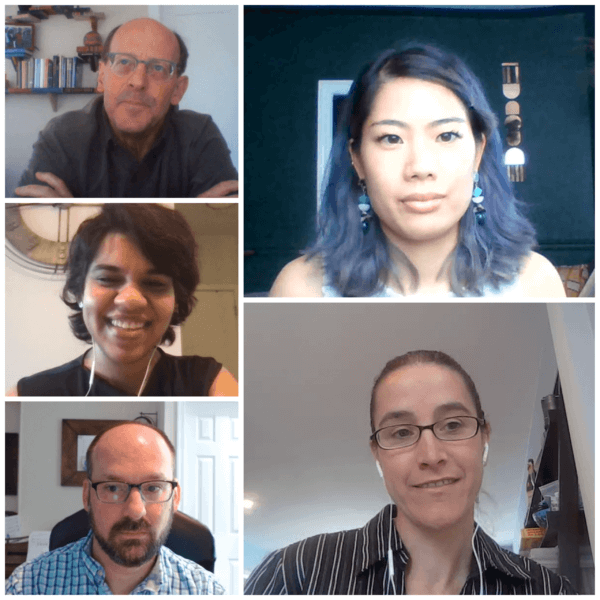
Summer Forum 2021: Advocate for Immigrants Through Pro Bono
By Amelia Patrick
On June 10, we convened the Immigration and Human Rights Panel for our Summer Forum 2021. This panel focused on the many ways that lawyers can advocate on behalf of immigrants, helping them navigate a broken legal system. The panelists highlighted their pro bono or public-interest experience in immigration law and identified opportunities in the DC area and throughout the nation for lawyers and law students interested in immigration law to get involved.
The moderator of this panel was Michael Lukens, Associate Director of CAIR Coalition. The panelists included:
- Amber Qureshi, Staff Attorney with the National Immigration Project of the National Lawyers Guild
- David Friedland, Principal at Beveridge & Diamond
- Sam Hsieh, Senior Attorney and Coordinating Legal Liaison with CAIR Coalition’s Immigration Impact Lab
- Laurie Ball Cooper, Legal Director at Ayuda
The panel began with an overview of their work. Amber described her work as the intersection of immigration and criminal law with a focus on these sectors’ legislative work and policy implications. As a whole, Amber’s organization works to legally protect and improve the rights of all immigrants.
Although David’s law firm, Beveridge & Diamond, is known for its environmental law work, the firm also has a strong pro bono program. Beveridge & Diamond attorneys partner with CAIR Coalition and other organizations on a variety of pro bono matters. Personally, David began his pro bono service in 2003 when he aided an immigrant who was fleeing from Rwanda. Since then, David has become passionate about helping immigrants and the positive impact pro bono representation can have on the lives of both clients and lawyers.
Sam’s role at CAIR Coalition’s Immigration Impact Lab is to help meet its goal to “expand upon its cutting-edge impact litigation to engender systemic change via legal precedent to benefit myriad groups of immigrants.” Sam is “boots on the ground” representing individuals in immigration detention.
As Ayuda’s Legal Director, Laurie Ball Cooper works to make legal services available to low-income immigrants in the DMV area, in addition to providing holistic services to them, such as language and social services. One concentration of her work is Project End, which provides legal services to aid immigrants who have been harmed financially or legally by immigration legal services fraud.
The need for pro bono representation in immigration proceedings is enormous. All of the panelists agreed that the U.S. immigration system is broken. Specifically, Amber noted that there is an extreme power imbalance in this work, and one must approach the work with that in mind, knowing that it may take hours and hours of work for a case to end positively. Sam also noted that the system often treats clients unfairly and that the system needs transformation so that the fullness of humanity is recognized. There are opportunities for pro bono assistance across the country. To get connected to pro bono opportunities in immigration law, start with organizations that do this work in your area. Most will have information on their websites about how lawyers and law students can get involved.
While each panelist admitted that it can be exhausting to work within this broken system, they all commented on how individual wins for their clients make it all worth it. David described it as being happy with an individual case win because those cases can change the world for an individual. Laurie agreed that while there is a need for change in the system, embracing the small wins and drawing inspiration from your clients’ resilience can be great motivators.
Amber shared an example of such a win. Her organization was able to fight for a detention center closure, which ended the practice of non-consensual medical procedures on the women there. David also described how the work with his Rwandan client was life-changing for him and his client. David remains friends with this client and has seen his family grow and prosper. Stories like these illustrate just how life-altering pro bono representation can be for a client.
Pursuing a public-interest career may seem daunting if you also carry student loan debt. However, there are student loan repayment programs available and federal public interest loan forgiveness, which may mitigate student loan debt. Students should reach out to their law school’s career services office to explore options. Sam also noted that there are opportunities to represent immigrants while working in the private sector as pro bono lawyers, or perhaps at a government agency. For those who wish to pursue immigration work full-time, the panelists were unanimous in their suggestions: participate in a clinic to gain experience in direct client representation, and take immigration law and administrative law courses while in law school. Additionally, employers frequently require being fluent in a language besides English.
However, having prior immigration experience and knowing another language is not critical to volunteering for pro bono work. Individuals do not have to be full-time immigration lawyers to make life-changing impacts on immigrants’ lives. Most organizations provide training and mentors to their pro bono lawyers. If you have the desire to help, there are resources to help you be successful.
If you missed this panel or wish to review the panelists’ fantastic advice, the video recording is available here.
Contribute to the Summer Forum conversation on social media using #SumFo21.
Amelia Patrick is the 2021 Washington Council of Lawyers summer intern.






